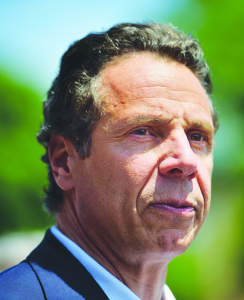Out of a seemingly perfect storm of gridlock, an incomplete, last-minute deal on rent regulations and the 421a tax abatement program emerged in Albany late last month. But a key yet-to-be-hammered out provision could hamper developers’ ability to plan projects for the rest of the year.
In Albany, end-of-session packages are known as a “big ugly.” And in this case, the name befits the circumstances. The sudden and shocking turnover in the leadership of both houses of the legislature — Sheldon Silver and Dean Skelos gave up their respective roles atop the Assembly and Senate amid real estate-related corruption scandals during the session — helped bring what were already going to be tough negotiations to a near impasse.
That situation was exacerbated by a highly public schism between Gov. Andrew Cuomo and Mayor Bill de Blasio. The mayor proposed his own comprehensive reforms for the programs, which won the backing of the Real Estate Board of New York, but the governor labeled them “a giveaway to developers.”
The bill passed June 25 had something for almost everyone, but left unresolved the key issue of increasing wages for construction workers at 421a projects. Rent regulations were extended for four years, while 421a got six months.
By the end of the year, REBNY and the construction unions must work out an agreement on wages. If they reach a pact, 421a will be extended for four more years. If not, it could be scuttled.
Now, with billions dollars at stake for developers, the industry is gearing up for the next round of negotiations.
And both sides agree that ending the program, which is tapped for the vast majority of rental projects in the city, would strike a major blow to affordable housing.
“Most of our product goes to the middle-class,” Boaz Gilad of Brooklyn-based developer Brookland Capital told The Real Deal. “It’s going to be very, very difficult to build smaller-scale developments on prevailing wages, and the middle-class won’t be able to afford the rentals that are so needed in Brooklyn.”

Mayor Bill de Blasio
The timeline leaves developers scrambling to get projects in the ground before the six-month extension expires, while making it more difficult to plan for new projects, especially rentals, since the cost of labor is still up in the air.
“There’s no way to know anything,” David Schwartz, a principal at Slate Property Group, told Capital New York. “We don’t even know what the issues are. We don’t know anything, and it’s impossible to make that gamble, because it’s not possible to build rentals without 421a.”
Schwartz told the website that four or five of his rental projects in the pipeline will likely be scrapped for condos.
That increases the stakes even more.
“I think there will be challenges and everybody will have to compromise,” lobbyist Suri Kasirer of Kasirer Consulting told TRD. “I think it’s going to be tough, because this was a big win for the unions, but on the other hand, everyone wants construction and development to happen.”
The 421a extension adopts several of de Blasio’s proposals:
• The length of the tax abatement goes to 35 years from 25.
•All rental projects receiving the subsidy must include affordable units.
•The new law gives developers a “menu” of three affordable housing options to choose from.
The new rent laws, meanwhile, don’t end vacancy decontrol, as the mayor proposed, but do increase the threshold at which affordable units can be deregulated to market-rate, to $2,700 from $2,500.
“There will be quiet discussions among the participants [so] when they come back to repair these problems in six months, they can resolve these issues,” said political strategist Hank Sheinkopf.
Sheinkopf who added that while real estate companies and their stakeholders are significant political donors, the industry’s role in the debate was “complicated by the scandals of late, which has reduced [their] leverage.”
“If lobbyists had all the power people say they do,” he noted, “then someone could flick a switch and it would all go away.”

Gov. Andrew Cuomo
Gov. Andrew Cuomo
What he wanted: The governor was a key supporter of instituting prevailing wages for construction workers on 421a projects.
What he got: 421a was extended for six months, with a four-year extension contingent on a wage deal.
What he didn’t get: A definitive prevailing wage deal; the final agreement will likely be a compromise.
Mayor Bill de Blasio
What he wanted: The mayor wanted to eliminate 421a for most condo projects, but extend most of the program, to end vacancy decontrol, to create a mansion tax and a new “menu” of affordable options for developers.
What he got: Vacancy decontrol rent price “cap” was increased slightly. 421a abatements were extended to 35 years and Manhattan condo and co-op projects were excluded. All projects that get a 421a exemption must include affordable components. His idea of a new “menu” of options for developers of affordable housing was adopted.

Steven Spinola
What he didn’t get:
Vacancy decontrol elimination plan rejected. No mansion tax. Condo projects outside Manhattan still can qualify for 421a abatement.
REBNY
What it wanted: REBNY supported ending 421a on condo projects and a revised menu of affordable options for developers.
What it got: A short-term 421a extension, giving it time to hammer out a wage deal with unions.
What it didn’t get: The full extension it was hoping for, which continues the uncertainty for the industry.
